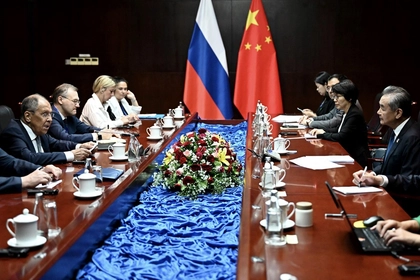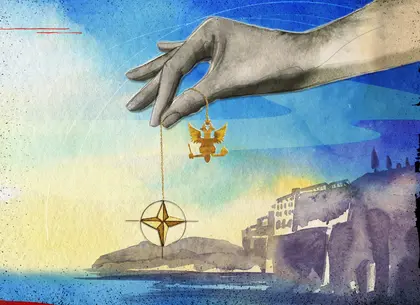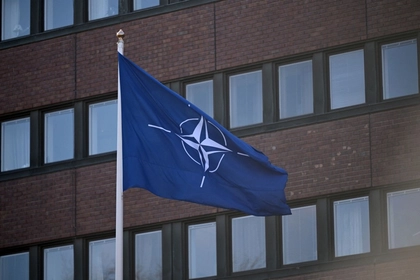Pizza, spies and mandolino
Italy, often described as a front-line in the Cold War confrontation between east and west, features in its inherent destiny of being a spy nest. Naples, the home of pizza, and the host city of the NATO Joint Forces Center, features even more prominently. In the last few years, many of the espionage cases that reached the editorial rooms of newspapers, had their center in and around Naples.
But the case of “Maria-Adela” appears more stunning than others. While the cover story of this “illegal” in Italy seems too cheap to be on the pages of a crime novel, it turns out it was enough to guarantee a GRU agent – Olga Kolobova – almost 10 years of operations, much of it on Italian territory, and around a major NATO facility.
The case was eventually exposed by a journalistic investigation authored by Bellingcat, in collaboration with Der Spiegel, La Repubblica, and The Insider, published now after 10 months of research.
Maria Adela Kuhfeldt Rivera was the name of the character impersonated by the GRU agent. She said she was born in Peru to a German father and that when she was two years old she was brought by her mother to Moscow to attend the 1980 Olympics. However, when in Moscow, her mother had to urgently return to Peru, so she was left there in the care of a soviet family. She said that consequently she was brought up in the Soviet Union, and this was what she regarded to be her “real” family.

Russia, China FMs Meet as ASEAN Talks Get Underway in Laos
This absurd story – that is, by the way, typical of GRU illegals covers – was to justify her not-so-South American looks, and her persistent Russian accent, so as to cover up her potentially frequent travel to Moscow, and her Russian passports.
With this heavy personal baggage, Maria Adela was about to compete for the “hearts and minds” of the Joint Forces Command (JFC). She established a jewel brand – supposedly a luxury one, actually selling worthless bijoux – and moved apartments in the most affluent parts of Naples; without any credible source of income, she was the life of the party and even managed to become secretary of a club associating several members of that “expat” community around the JFC. In the meantime, she got married (to another mole, of course), and briefly after she became a widow (her spouse was recalled to Moscow). She traveled to Bahrain (home to other key allied military facilities) and gifted her bijoux to its then prime minister. She had had personal liaisons with a number of men in Naples and befriended a lot of ladies. But the “only stable thing in her life” was Luisa, her black cat. Luisa was the protagonist of many pictures posted on Maria Adela’s Facebook page. Luisa had traveled with her to Moscow until the last time. Now that Maria Adela’s identity has been revealed, she probably continues to eat caviar from a small kitty bowl. Maria Adela now seems to work in a gray public office in downtown Moscow, and every day she drives back to her luxury apartment in an affluent neighborhood of the Russian capital in an Audi. A black cat, an Audi, and a beautiful, empty house.
She returned suddenly to Moscow on September 15, 2018. It was the day after Bellingcat had uncovered the identities of the agents involved in the Skripal poisoning case in Salisbury, England.
A Counterintelligence goldmine
The story of Maria Adela is certainly a rich one, and worth read about in full if you are curious. Here, cutting the details on her life under cover, let’s concentrate on some key findings of the investigation.
The investigation was conducted on the basis of open source materials, leaked databases and many interviews.
One fundamental element was the passport number, as in the Skripal poisoning case. It appears that at a certain point in the past (the Maria Adela case means it happened at least over 10 years ago), the GRU created a cluster of fake passports for their illegals. The only thing is is that the serial numbers of all those passports are consecutive. This creates a cluster of passports showing similar numbers that may prove a true goldmine for future investigations for uncovering illegals even while they’re still operating abroad.
In a conversation published on the twitter profile of Bellingcat, the authors of the investigation discuss in-depth the how and why of their research. They also state that while the investigation was completed after Kolobova a.k.a. Maria Adela, had already fled and did not provide any certainty as to whether the illegal could have stolen any classified material, the authors are confident that this case will instigate a cascade of further investigations.
The Counterintelligence alarm
The uncovering of Kolobova, another Russian spy in Italy, through an investigation by journalists, has raised concerns about the capability of Western counterintelligence to tackle the job of this particular type of operative in a timely manner.
Kyiv Post spoke to Luigi Sergio Germani, director of Istituto Gino Germani di Scienze Sociali e Studi Strategici and an Italian expert on Russian affairs and intelligence, to discuss this topic.
“Unlike agents under diplomatic cover, or legals in general, ‘illegals’ are way more difficult to spot’, explains Germani. “The kind of cover employed serves different ends: while legals operating under diplomatic cover benefit from immunity and are useful to serve within an institutional framework, illegals under deep cover do pose as ordinary people and are usually not employed on operations that require direct access to documents or other kind of classified material. But the material they can collect within their missions, is much more valuable anyway. In fact, they are usually employed as ‘spotters’ – they are supposed to get close enough to a (human) target to be able to ‘spot’ its vulnerabilities, i.e. financial, psychological, social weaknesses, which may be exploited to recruit them. Illegals are a Russian tradition.”
In fact, not only was Maria Adela close enough to some people to be able to spot their weaknesses, but she could have been even close enough to build, to create those weaknesses. For example, by collecting “kompromat” (compromising materials), as it was disclosed that she had also cultivated a personal relationships, albeit short-lived ones, with certain figures.
“Counterintelligence is conducted by local authorities in collaboration with allied foreign agencies. The counterintelligence answer to an illegal operation may be very aggressive. The most aggressive measure to be taken in such cases is to turn the illegal into a double agent, thereby compelling him or her to work for the host service while pretending to be working for his or her home service. However, these are risky measures and they are not always privileged.”
A political issue for Italy and beyond
To unleash the full potential of a counterintelligence operation, “political support is needed”, Germani explains. The famous case of Walter Biot, for instance, (an Italian officer recruited by the Russians to take documents from his office), got a quick response, and without such aggression, but with great media coverage. “The idea was to avoid overly risky moves, while emphasizing the fact, so as to give a signal”.
However, “in Italy we are not sufficiently conscious and don’t have an established counterintelligence culture, in general. Plus, we are affected by a certain, persistent ‘Russia naivete’ ”, Germani adds. “Counterintelligence may be restrained or enhanced by the political will” of whoever is in charge of governing the country. The risk that a new government with a less Atlanticist stance reduces the necessary focus on the Russian espionage problem in Italy “is a concrete one”, and “relevant also to those Allied facilities hosted on our territory.”
You can also highlight the text and press Ctrl + Enter






